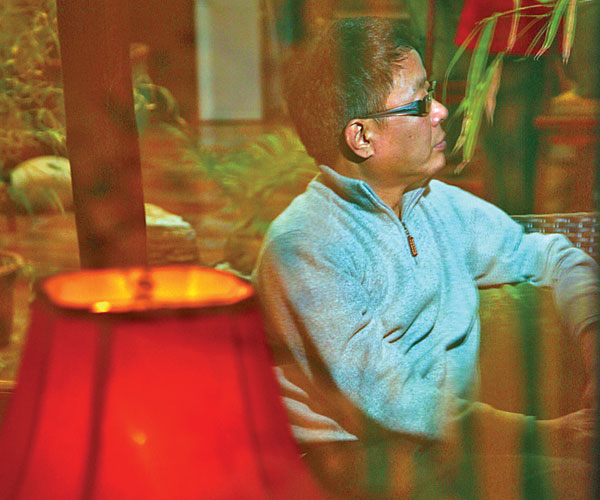The patient: Saved from certain death, spreading the hope he recovered
Updated: 2011-11-25 08:18
By He Na (China Daily)
|
|||||||||||
He is considered to be China's longest living AIDS patient. He was diagnosed in 1995.
Meng Lin is not the real name of this thin, gay man in his early 40s, who stands at medium height and wears his hair very short.
"Some AIDS patients who were exposed by the media either lost their jobs or were abandoned by relatives and friends. Though people are more tolerant than before, discrimination against AIDS still is deep in many people's minds," he said.
"When people refer to AIDS just like we talk about catching a cold, then I will tell you my real name."
 |
|
Meng Lin has survived 16 years since he was diagnosed with AIDS, and he works to help other patients reach a normal lifespan. Provided to China Daily |
Meng's story should begin in late 1995, when he developed constant diarrhea and fever that led to a diagnosis of AIDS.
"In the 1990s, information was still very limited, so all I got was that AIDS is horrible and a terminal disease. People equated it with being sentenced to the death penalty.
"The diagnosis plunged me into the blackest horror and despair. During the first week, I spent most of the time alone on the top of high buildings ... I needed help, but I did not have the courage to tell anyone. While people were immersed in the happiness of the lunar new year, I was planning my death."
But fearing he might infect family members, Meng decided to tell his brother.
The brother's wife is a doctor, and Meng thought they would understand his fear. Instead, his brother hinted that Meng should leave. Collecting a few clothes, he left home forever that night while others were lighting fireworks and firecrackers.
"The feeling of loneliness overwhelmed me. I knew I lost everything. I wandered on the street, aimless," he said. "At that time I was not afraid of death at all. To the contrary, I thought death was a mercy."
From death's edge
Finally he declared war on fate - on two fronts. In a bid to treat himself, he went to drugstores to buy all the medicine that might control his symptoms and the disease. But he also sought out doctors for treatment.
"Maybe I was not destined to die, for I found Dr Xu Lianzhi from Beijing You'an Hospital. I need to say, without Xu, I would not be here to talk with you. I thought of her as my mom. I call her Mom now."
Xu's help and care pulled him back from death, but she could not provide effective medicine. AIDS treatment did not exist in China at that time.
"The hospital didn't even have wards for AIDS patients," Meng said. "In order to treat me and four other patients, the hospital rebuilt several rooms beside the mortuary. We all signed a contract volunteering to receive treatment there, for we were counting the days until we died."
Each day, besides having their blood pressure and temperatures checked, the men were treated with traditional Chinese medicine.
"My situation was better than before, but the treatment was still not very effective. Several months later, Dr Xu told me the United States had launched some medicine that could treat AIDS, but it cost at least 200,000 yuan ($31,500) each year."
The news ignited Meng's hope for life.
"I didn't want to wait for the coming of death. So after a few weeks of deep thought, I decided to start my own business to earn money for the medicine."
It wasn't easy, and Meng slept only three or four hours a day at first. "Maybe the urge to survive supported me."
He cried when he got the first batch of medicine from the US with his hard-earned 100,000 yuan.
With the help of medicine, Meng pulled through the first few years, 1997-2000. Without it, three of the patients in his group died.
"I never took my medicine in front of them, for what I ate was not medicine, but the hope of life. My ability was so limited. I could not save them."
A normal lifespan
When his situation improved, he began to help other patients.
Meng joined an AIDS patients' outing in the suburbs one day in 2004, and he talked about his experience with AIDS treatment. He had not expected his own story could give so many others hope for life.
Realizing the effect, Meng began to frequently appear at HIV/AIDS control activities. In 2005, he founded an organization called Ark of Love, which provides community-based care and medical help for HIV/AIDS patients and their lovers and relatives.
He also opened a blog under the name Meng Lin, AIDS patient, to share his thoughts and help others who were stranded by the disease.
"I want them to know that with the improvement of anti-AIDS technology and medicine, it is now possible that AIDS patients who receive good treatment can reach the average lifespan of normal people. They should not easily give up treatment, and meanwhile need to stand up to call for their rights."
Among those rights, he includes treatment at hospitals. "Many refuse to take HIV/AIDS people," he said.
Ark of Love has received some financial support from international funds, and Meng wants to use that money to help more people. The organization has researched HIV/AIDS groups, how patients have been treated personally as well as medically, the problems they have encountered and the changes they think need to be made.
Meng said the Ark has conveyed that information to the appropriate departments, and "now we are conducting a report to the central government to call for changes in this field".
Hot Topics
HIV/AIDS, Egypt protest, Thanksgiving, climate change, global economic recovery, home prices, high-speed railways, school bus safety, Libya situation, Weekly photos
Editor's Picks

|

|

|

|

|

|







